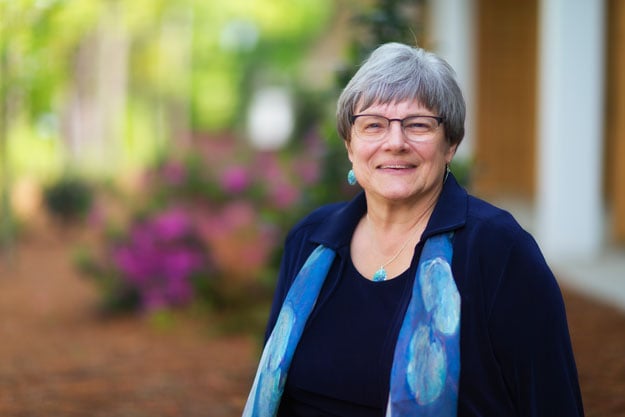A Most Rewarding Job

LAURIE BYSTROM, president and CEO of LOWER CAPE FEAR HOSPICE & LIFECARECENTER looks at home in the agency’s bright, energy-efficient administrative building. She has seen the organization grow from one that served five counties and seventy patients to one that serves more than 600 patients in six North Carolina counties and three South Carolina counties.
Encouraged by the agency’s increasing capabilities, she says, “This has been my most rewarding job.”
A nurse by training, Bystrom completed the program at St. Vincent Charity Hospital School of Nursing in Cleveland, Ohio, earned a Bachelor of Arts in health service management at Ursuline College in Pepper Pike, Ohio, and got her master’s degree in public health from the University of North Carolina at Chapel Hill.
After nursing training, Bystrom worked in her community hospital for twenty-four years. She rose from staff nurse to director of nursing there before moving to Wilmington for then-husband’s job opportunity. She began working at New Hanover Regional Medical Center the in women’s surgery department and later moved to obstetrics.
Eventually Bystrom came to Lower Cape Fear Hospice (LCFH) as clinical director of the mother and baby program. When the organization’s CEO retired in 2000, Bystrom became the second leader in the history of LCFH, which began helping patients thirty-five years ago.
While working as a nursing supervisor back in Ohio, Bystrom found she had what it took to speak with families during difficult times, and she honed those skills.
“I learned what to say and what not to say,” she recalls.
At that time, Elisabeth Kübler-Ross’ work on death and dying became well-known, and Bystrom took a class to learn the material.
A new hospice program rented space in her building during that same period, and she learned from her hospice nurse colleagues. All these opportunities led to what she shares today.
Bystrom recalls reading the idea that hospice nurses aren’t hired, they’re called.
Hospice is a benefit that offers health care, assistance, and education to patients (infants to adults) and their families facing advanced illnesses, according to the group’s materials. Medicare, Medicaid, and most private insurances have a hospice benefit, but as a nonprofit, the agency does not deny patients. It is funded by the nonprofit Lower Cape Fear Hospice Foundation and governed by a board of directors.
LCFH’s palliative care and CarePath teams help patients who have chronic illnesses to improve quality of life, ease pain, and treat symptoms while meeting patient goals. These patients are not necessarily terminal. Additionally, LCFH is a level two We Honor Veterans agency, which recognizes the special needs of veterans.
Most hospice patients are treated in the home, but three inpatient facilities offer short-term acute care in New Hanover, Brunswick, and Columbus counties.
“We were blessed to grow incrementally,” says Bystrom of LCFH’s journey.
Started in 1980 by local physician Daniel Gottovi and a group of community volunteers, in 1997 the organization opened the Dr. Robert M. Fales Hospice Pavilion in Wilmington with twelve beds, one of the early hospice patient care centers in North Carolina.
By 2004, LCFH had a visionary board leader who asked how many patients the program would serve in the future, based on population growth, Bystrom says.
The prediction was that in three to five years, LCFH would serve 300 to 350 patients. That has come to pass.
The board funded growth for three years from that point, while LCFH set up nursing home teams, developed outreach provider teams to educate medical personnel, hired a full-time physician, and initiated several programs (such as palliative care). Angel House, a six-bed facility in Whiteville opened in 2008, and the seven-bed SECU Hospice House of Brunswick began serving patients in 2012. An expansion of the Dr. Robert M. Fales Pavilion opened in the fall of 2014, adding a six-bed wing to the original facility.
Bystrom was at the helm through all these changes and more.
As therapies and medicines change, more treatment is available for patients, but it’s also more expensive. The cost to Medicare and Medicaid has increased, and in recent years there have been cuts to the budget. Doing more with less has become the reality, but Bystrom strives to balance that with quality care.
To help get it all done, more than 600 volunteers lend helping hands to the staff and patients at LCFH.
Bystrom strikes her own work-life balance with five grandchildren living nearby.
“I love being a grandmother, so I do a lot of things with them,” she says. “Friday night is a family dinner, usually for fourteen people, at my house.”
Cooking, gardening, and traveling are some of Bystrom’s favorite activities. With family living in far-flung places from Alaska to Costa Rica, there are always fun places to go.
And Bystrom knows what it’s like to have hospice available when it’s needed.
“My mom was cared for recently by our staff,” she says. “It was so nice to be able to turn things over and just be the daughter.”
To view more of photographer Chris Brehmer’s work, go to http://www.chrisbrehmerphotography.com/